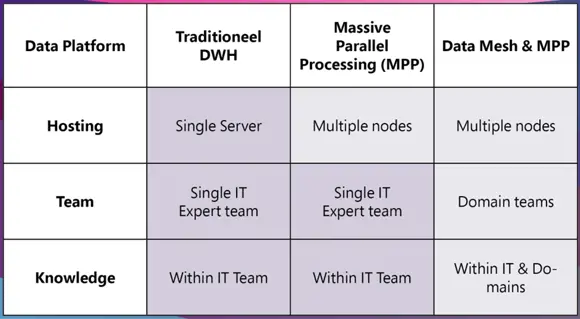Read more
From our Data, Analytics and AI experts
Data mesh is hot in the world of data platforms and Azure
Data mesh is hot. This is understandable, as data mesh offers the solution to a long-standing problem: scalability of data platforms. Perhaps data mesh can provide a breakthrough within your organization as well. In this blog, I'll tell you what the main benefits and challenges of a data mesh architecture are.
The term data mesh was introduced by ThoughtWorks consultant Zhamak Dehghani. It is an architecture in which distributed data products are developed and managed by data engineers and data product owners in domain teams. A shared infrastructure is used to host, prepare and offer data. As central data teams are acknowledging en masse that they are running into limits, data mesh has become a major trend in the world of data platforms. How did this situation arise?
In the 1980s, the data warehouse emerged: a central data environment to report from. It was the answer to the question of how to get an overall picture of the state of an organization. This centralization, in turn, brought new challenges, for example in terms of technology, knowledge and staffing. Finally, the logical consequence of an ever-growing data platform, an ever-growing server and an ever-growing team.
A solution to the technical challenge arrived in the year 2000 or thereabouts: parallel processing, on the Hadoop ecosystem, among others. Before the advent of parallel processing, the most common solution to performance problems was a larger server: scale up.
With the advent of parallel processing, multiple servers could be deployed to host the data platform: scale out.
But having a data warehouse and parallel processing does not solve the scalability problem for knowledge and staffing. A larger data platform still requires a larger central team with centrally collected data engineering knowledge: scale up. This is why vertical splits are often made in IT environments, with data engineers and data analysts working in different teams. The disadvantage of this split is that different teams are needed for each data product.
The big advantage of data mesh is that it provides a full-fledged scale-out solution:
Splitting the central data team and the knowledge around it into domain teams, each with its own expertise. This enables domain teams to deliver optimal business value within their own areas of expertise. With the right standards, tools and knowledge, domain teams are able to deliver data products themselves and offer them centrally.
• The domain team manages data quality and can monitor and improve it well;
• The domain team knows the right definitions and can apply and share them well;
• The domain team knows the data users, can serve them well and give them peace of mind;



Essential questions that every organization must have answered prior to a data mesh implementation are:
An implementation of data mesh makes sense only if the benefits of decentralization outweigh the investment in setting up the platform and standards. Therefore, data mesh is an appropriate solution for (in particular) organizations with multiple divisions and/or an international character.
Also, data mesh requires a new role for IT teams, both in support and control. The IT teams must support the domain teams with the platform and appropriate tools. In addition, they must control the domain teams by overseeing the application of uniform standards.
With multiple domain teams each delivering their own data products, good support is needed in the following areas: standards for accessible description of data products, support for modern tooling, and understandable data transformation standards.
You have probably already asked yourself the question: how can I maintain control in an environment with multiple independent teams? The answer: standardization and policy. Establishing standards ensures that there is no proliferation of code and descriptions. When managing domain teams, firmly delineated policies are needed: it should not be possible to release code or documentation that does not conform to standards relating to naming, structure and tagging.


Data mesh in the Azure cloud
Data mesh is not a cloud service that you just turn on or off. It's a combination of the right approach with the right tools. When optimally applying a data mesh architecture in the Azure cloud, the following services deliver maximum value:
Want to learn more about the key benefits and challenges of data mesh within your organization, or get started on it immediately? Connect with our Data & Analytics experts!
Read more
From our Data, Analytics and AI experts
We, and third parties, use cookies on our website. We use cookies to keep statistics, to save your preferences, but also for marketing purposes (for example, tailoring advertisements). By clicking on 'Settings' you can read more about our cookies and adjust your preferences. By clicking 'Accept all', you agree to the use of all cookies as described in our privacy and cookie policy.
Purpose
This cookie is used to store your preferences regarding cookies. The history is stored in your local storage.
Cookies
Location of Processing
European Union
Technologies Used
Cookies
Expiration date
1 year
Why required?
Required web technologies and cookies make our website technically accessible to and usable for you. This applies to essential base functionalities such as navigation on the website, correct display in your internet browser or requesting your consent. Without these web technologies and cookies our website does not work.
Purpose
These cookies are stored to keep you logged into the website.
Cookies
Location of Processing
European Union
Technologies Used
Cookies
Expiration date
1 year
Why required?
Required web technologies and cookies make our website technically accessible to and usable for you. This applies to essential base functionalities such as navigation on the website, correct display in your internet browser or requesting your consent. Without these web technologies and cookies our website does not work.
Purpose
This cookie is used to submit forms to us in a safe way.
Cookies
Location of Processing
European Union
Technologies Used
Cookies
Expiration date
1 year
Why required?
Required web technologies and cookies make our website technically accessible to and usable for you. This applies to essential base functionalities such as navigation on the website, correct display in your internet browser or requesting your consent. Without these web technologies and cookies our website does not work.
Purpose
This service provided by Google is used to load specific tags (or trackers) based on your preferences and location.
Why required?
This web technology enables us to insert tags based on your preferences. It is required but adheres to your settings and will not load any tags if you do not consent to them.
Purpose
This cookie is used to store your preferences regarding language.
Cookies
Why required?
We use your browser language to determine which language to show on our website. When you change the default language, this cookie makes sure your language preference is persistent.
Purpose
This service is used to track anonymized analytics on the HSO.com application. We find it very important that your privacy is protected. Therefore, all data is collected and stored on servers owned by HSO with no third-party dependencies. This cookie helps us collect data from HSO.com so that we can improve the website. Examples of this are: it allows us to track engagement by page, measuring various events like scroll-depth, time on page and clicks.
Cookie
Purpose
This cookie enables HSO to run A/B tests across the HSO.com application. A/B testing (also called split testing) is comparing two versions of a web page to learn how we can improve your experience. All data is collected and stored on servers owned by HSO with no third-party dependencies.
Purpose
With your consent, this website will load Google Analytics to track behavior across the site.
Cookies
Purpose
With your consent, this website will load the Microsoft Clarity script, which helps us understand how people use the site. The cookies set by Clarity collect session-level data like how the visitor landed on the site, which pages they viewed, their language preference, and even their general location. This data powers Clarity’s features like heatmaps and session recordings, helping us see which parts of a page get attention and where users drop off. The goal isn’t to track individuals, but to understand patterns that can improve the user experience. Learn more about Microsoft Clarity cookies here.
Cookies
Technologies Used
Cookies
Purpose
With your consent, this website will load the Google Advertising tag which enables HSO to report user activity from HSO.com to Google. This enables HSO to track conversions and create remarketing lists based on user activity on HSO.com.
Possible cookies
Please refer to the below page for an updated view of all possible cookies that the Google Ads tag may set.
Cookie information for Google's ad products (safety.google)
Technologies Used
Cookies
Purpose
With your consent, we use IPGeoLocation to retrieve a country code based on your IP address. We use this service to be able to trigger the right web technologies for the right people.
Purpose
With your consent, we use Leadfeeder to identify companies by their IP-addresses. Leadfeeder automatically filters out all users visiting from residential IP addresses and ISPs. All visit data is aggregated on the company level.
Cookies
Purpose
With your consent, this website will load the LinkedIn Insights tag which enables us to see analytical data on website performance, allows us to build audiences, and use retargeting as an advertising technique. Learn more about LinkedIn cookies here.
Cookies
Purpose
With your consent, this website will load the Microsoft Advertising Universal Event Tracking tag which enables HSO to report user activity from HSO.com to Microsoft Advertising. HSO can then create conversion goals to specify which subset of user actions on the website qualify to be counted as conversions. Similarly, HSO can create remarketing lists based on user activity on HSO.com and Microsoft Advertising matches the list definitions with UET logged user activity to put users into those lists.
Cookies
Technologies Used
Cookies
Purpose
With your consent, this website will load the Microsoft Dynamics 365 Marketing tag which enables HSO to score leads based on your level of interaction with the website. The cookie contains no personal information, but does uniquely identify a specific browser on a specific machine. Learn more about Microsoft Dynamics 365 Marketing cookies here.
Cookies
Technologies Used
Cookies
Purpose
With your consent, we use Spotler to measures more extensive recurring website visits based on IP address and draw up a profile of a visitor.
Cookies
Purpose
With your consent, this website will show videos embedded from Vimeo.
Technologies Used
Cookies
Purpose
With your consent, this website will show videos embedded from Youtube.
Cookies
Technologies Used
Cookies
Purpose
With your consent, this website will load the Meta-pixel tag which enables us to see analytical data on website performance, allows us to build audiences, and use retargeting as an advertising technique through platforms owned by Meta, like Facebook and Instagram. Learn more about Facebook cookies here. You can adjust how ads work for you on Facebook here.
Cookies
Purpose
With your consent, we use LeadInfo to identify companies by their IP-addresses. LeadInfo automatically filters out all users visiting from residential IP addresses and ISPs. These cookies are not shared with third parties under any circumstances.
Cookies
Purpose
With your consent, we use TechTarget to identify companies by their IP address(es).
Cookies
Purpose
This enables HSO to personalize pages across the HSO.com application. Personalization helps us to tailor the website to your specific needs, aiming to improve your experience on HSO.com. All data is collected and stored on servers owned by HSO with no third-party dependencies.
Purpose
With your consent, we use ZoomInfo to identify companies by their IP addresses. The data collected helps us understand which companies are visiting our website, enabling us to target sales and marketing efforts more effectively.
Cookies